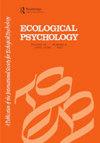从生态学角度看语言发展:抽象符号的生态学有效途径
IF 1.7
3区 心理学
Q3 PSYCHOLOGY, EXPERIMENTAL
引用次数: 55
摘要
摘要在具体的、情境的、制定的和分布的认知方法中,语言的协调作用凸显出来。语言具有符号特性,源于多模式的互动事件流,并逐渐获得以功能和适应性的方式约束它们的力量。在这篇文章中,我们试图将认知系统中的三种信息处理方法结合起来,为语言作为协调人的发展过程提供理论背景。生态心理学解释了任何行为或事件是如何通过“调整”到控制个人和集体行为的可供性的过程而变得信息丰富的。动态方法有助于将这种控制作为个体和集体系统自由度的功能性降低来操作。认知符号学提供了一种约束类型,显示了它们之间的相互关系:它提出了一些条件,在这些条件下,作为索引和图标的信息控制可能成为象征性的,提供了一个质的不同形式的约束,它可以部分地与正在进行的多模式事件流无关。本文以实际亲子互动为例说明了所提出的过程,并指出了以更定量的方式验证这些过程的方法。本文章由计算机程序翻译,如有差异,请以英文原文为准。
Language Development From an Ecological Perspective: Ecologically Valid Ways to Abstract Symbols
ABSTRACT In the embodied, situated, enacted and distributed approaches to cognition, the coordinative role of language comes to the fore. Language, with its symbolic properties, arises from a multimodal stream of interactive events and gradually gains power to constrain them in a functional and adaptive way. In this article, we attempt to integrate three approaches to information in cognitive systems to provide a theoretical background to the process of development of language as such a coordinator. Ecological psychology provides an explanation for how any behaviors or events become informative through the process of “tuning” to affordances that control individual and collective behavior. The dynamical approach helps to operationalize this control as a functional reduction of degrees of freedom of individual and collective systems. Cognitive semiotics provides a typology of constraints showing their interrelations: it proposes conditions under which informational controls that function as indices and icons may become symbolic, providing a qualitatively different form of constraint, which can be partially ungrounded from the ongoing stream of multimodal events. The article illustrates the proposed processes with examples from actual parent-infant interaction and points to ways of verifying them in a more quantitative way.
求助全文
通过发布文献求助,成功后即可免费获取论文全文。
去求助
来源期刊

Ecological Psychology
PSYCHOLOGY, EXPERIMENTAL-
CiteScore
3.30
自引率
10.50%
发文量
8
期刊介绍:
This unique journal publishes original articles that contribute to the understanding of psychological and behavioral processes as they occur within the ecological constraints of animal-environment systems. It focuses on problems of perception, action, cognition, communication, learning, development, and evolution in all species, to the extent that those problems derive from a consideration of whole animal-environment systems, rather than animals or their environments in isolation from each other. Significant contributions may come from such diverse fields as human experimental psychology, developmental/social psychology, animal behavior, human factors, fine arts, communication, computer science, philosophy, physical education and therapy, speech and hearing, and vision research.
 求助内容:
求助内容: 应助结果提醒方式:
应助结果提醒方式:


